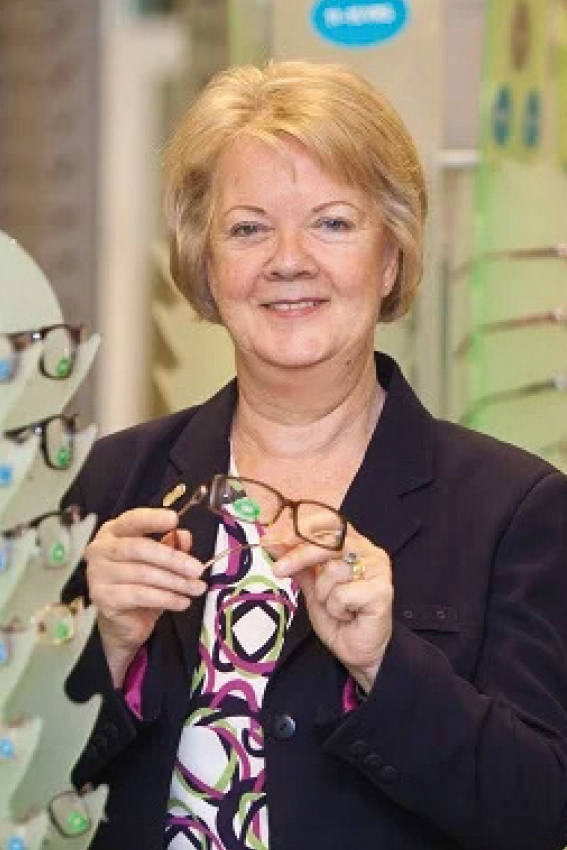
Aneurin Bevan may be spinning in his grave at what is happening with the NHS right now, but it hasn’t always been the case that the service covered all aspects of health and welfare.
Since its inception in 1948, ocular and dental care have been omitted from the sphere of automatic state-funded care. Most dental and ophthalmic practices manage to get limited funding for a few patients, but for the most part, people in the UK have had to pay for their eye tests, their spectacles, and their dental check up, and the drilling and filling.
It was into this world that the husband-and-wife team of Doug and Mary Perkins, who graduated from University College, Cardiff in the late 60s, found themselves. “It was a crazy time,” says Doug, “they made obstacles for anybody actually expanding.”
They began their own practice in Mary’s home town of Bristol, working days and evenings. During the next few years they began to expand.
Their business philosophy was to explore value for money to their customers - known as ‘patients’ then. They opened a series of practices outside Bristol under the name of ‘John Perkins & Partner’.
“We had to develop our practice solely on goodwill, by word of mouth and without advertising. We opened practices in places across the West Country and South Wales,” says Doug. “Everything in those days revolved around the NHS - all the lenses and the eye testing were standard. It was about the mid-70s that the fashion side broke out and NHS frames began to disappear.”
In 1980, the couple sold their chain of 23 outlets for around £2m, dissatisfied with how they were being corralled with restrictive business practice laws. By then, however, the monopoly in the optical care market was coming under governmental scrutiny. Within four years, Margret Thatcher’s Conservative government passed legislation to de-regulate the optician’s market - effectively breaking the stranglehold previously jealously held by independent local opticians.
Specsavers was founded in 1983 in Bristol. It was a different company to the one it would eventually become; for the first three months, they worked from their bedroom with two staff and a table tennis table for a desk.
They opened their first public store on the island of Guernsey the following year, taking full advantage of this new deregulation, with pilot stores opening in Swansea, Bath, Plymouth and new outlet in Bristol.
The stores were privately owned by the Perkins, although in partnership with a local optician. Specsavers – then as now – held a ‘helping hand’ stake in each business, charging a fixed management fee related to turnover. For this the optician had a full back-up in shop fittings, stock, equipment and deals with other business issues.
The optician chain’s joint venture structure, whereby each partner has a 50% stake in his or her store, offers partners a long-term incentive to perform well and grow. This structure – different from a franchising arrangement – is something Dame Mary Perkins believes offers greater rewards and motivation to each partner. It has been an excellent formula for growing a company and getting staff to buy into its vision.
Mary Perkins – a visionary
Mary Lesley Bebbington was born on February 14th 1944 in Bristol. She went to Fairfield Grammar School in her home city, before heading to University College, Cardiff to study ophthalmology. It was here that she met Doug Perkins, whom she later married.
After graduating, they took over two small optician’s practices owned by Mary’s father, which they renamed Bebbington & Perkins. They developed this business, changing it name, into a small but successful chain of 23 outlets, which they sold in 1980
In 1983, they set up their first Specsavers outlet, eventually going international with outlets in more than a dozen territories. By 2020/21, the company turned over £2.73bn across the franchises, with nearly 2,300 outlets employing 38,000 people. The Perkins themselves are estimated to have an estimated personal wealth of £1.55bn.
Although she may appear in the Sunday Times Rich List, she doesn’t really shout about it. On the subject of the importance of good business leaders being willing to listen and learn, she says, “I am willing to lead from the front and will muck in when needed. I treat others as I would like to be treated – whoever they are, staff, suppliers, anyone I meet.”
Amazingly, Specsavers has never had close a store, has no loans nor ever had any outside investment.
Awards and accolades
Within the company itself, her current title at Specsavers is ‘founder’. Dame Mary sits on the company board, oversees business development and has particular responsibility for running PR. She has admitted wearing disguises and visiting Specsavers stores, posing as a customer.
Dame Mary Perkins was made an honorary fellow of Cardiff University in 2005. She was the first female optometrist in the UK to receive the title of Dame Commander of the Order of the British Empire (DBE) in 2007.
The accolade was also in recognition of her charitable work, including the Guernsey annual ‘Specsavers Liberation Tea Dance for Pensioners,’ and her directorship of Women’s Refuge and Age Concern. She is also a patron to leading children’s safety and anti-bullying charity Kidscape.
In February 2013 she was rated as one of the 100 most powerful women in the United Kingdom by BBC Radio 4’s Woman’s Hour programme. In October 2017, Dame Mary was honoured with an EY Entrepreneur Of The Year UK Lifetime Achievement Award for her continued contribution to entrepreneurship and the economy.
Charitable work
As well as the patronages mentioned above, Dame Mary Perkins is a founding patron of the not-for-profit social platform ‘The Modern Muse Charity’; designed to encourage the next generation of female business leaders and entrepreneurs.
The platform, www.modernmuse.org, features the professional pathways of women working across business and society, with a focus on encouraging girls into STEM (science, technology, engineering and mathematics) careers.
Modern Muse seeks to improve female social mobility through engagement with education and by providing insight to the variety of career options, work experience, job placements, internships and apprenticeships available.
Philosophy
At the age of 78, Dame Mary clearly has no intention of letting up just yet. The plans are all in place for their children to take over – when the time is right.
When it comes to running her company with husband Doug, Dame Mary Perkins emphasises the importance of creating a good corporate culture as a business grows. She places high emphasis on good customer service, strong links with local communities, and an extensive charity programme.
One of her favourite phrases is ‘stick to the knitting.’ In this context, she means that companies like Specsavers, with huge customer databases, are continually approached by people with an idea for a new activity or market they might consider entering. But to her, it’s important to stick to core skills or activities that mesh with your existing skills and customer base.
“You might think an idea sounds glamorous,” she states, “but you have to ask, ‘Is it really going to help the company?’ Reputation is ever more important with the new media around. Companies should stay close to their customers and be part of their communities.” That said, the company did successfully expand into audiology in 2002 – and hearing aids are now a key service offered by Specsavers.
She also emphasises that, in the current economic climate, entrepreneurs need to make careful judgements about
the relative merits of expansion and consolidation.
Growing a business necessitates some ruthless decisions, she points out. Others would do well to remember that if they wish to grow as big as Specsavers.
SHOULD'VE GONE TO SPECSAVERS
The famous slogan has had the advertisement executive’s ultimate dream played out into reality – by entering the modern lexicography. The phrase was first used to advertise the company in 2002, and has featured on TV, in print and on billboards as a humorous dig as what happens when things go wrong in everyday situations due to poor vision.
Richard James, creative director at The Agency (Specsavers’ in-house creative agency), said on the occasion of the 20th anniversary of the ad, “ ‘Should’ve’s real strength isn’t in the joke, it’s in the friendly nudge it gives people towards better sight and hearing, while putting a smile on their face.”
The in-joke has even gone so far as Specsavers sponsoring the kits of rugby referees on the world stage, as well as Scottish Football League referees, for the past 20 years.





